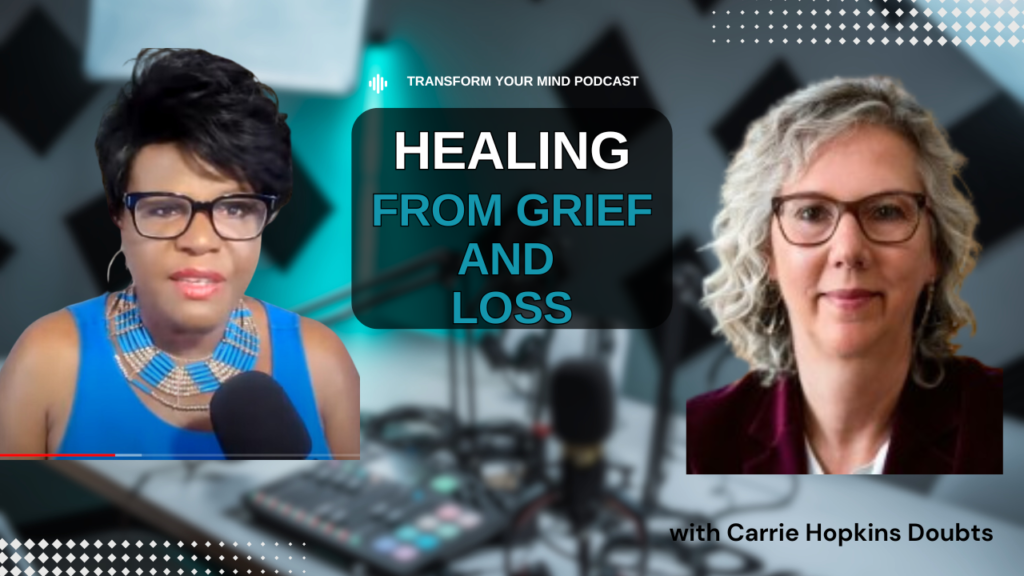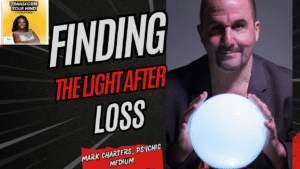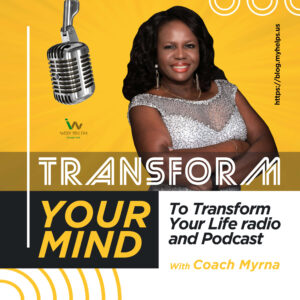Host Myrna Young and guest Carrie Hopkins Doubts explore finding meaning after loss in Life’s next chapter. Carrie, founder of Life’s Next Chapter Coaching, shares her expertise in guiding individuals through major life transitions, including loss and grief. With a Master’s in Spiritual Psychology, Carrie emphasizes embracing change compassionately and finding new purpose. Discover strategies for coping with grief, engaging in radical self-care, and leveraging mindfulness. Learn how Carrie’s personal experiences shape her unique approach to coaching, offering hope and renewal for those navigating the challenging path of finding meaning after loss.
Download the podcast here:
Key Takeaways
Embrace the transformative power of grief by welcoming its lessons and using them as stepping stones to personal growth.
Invoke mindfulness and self-care as vital strategies for navigating life’s upheavals, whether they stem from grief, divorce, or major life transitions.
Lean on a supportive community and coaching for a guided journey through the storms of life, ensuring that you’re not alone in your path to healing.
Grief and loss can bombard us like relentless storms, altering the very fabric of our existence. Yet, as Myrna Young and Carrie Hopkins Doubts discuss in their candid podcast conversation, these moments of profound loss—whether through death, divorce, or a significant life change—grant us an unexpected opportunity: the chance to transform heartbreak into a new chapter of healing. With Carrie’s personal and professional insights into grief coaching, we explore the power of embracing our pain, learning from it, and moving forward with renewed purpose and mindfulness.
The Transformative Power of Grief: Finding Meaning After Loss
In the dialogue between Myrna Young and Carrie Hopkins Doubts, the concept of grief as a teacher shines through. As Carrie shares, grief shouldn’t be something we fear or evade. “To the extent that we love what we have lost, we will grieve that deeply,” she asserts, encouraging us to meet grief with compassion and openness (0:12:11). By doing so, we invite transformation and personal growth.
Instead of resisting these turbulent emotions, Carrie advocates for allowing them to process naturally, which can be particularly challenging when cultural norms suggest we should quickly “move on.” However, the spiral nature of grief demands patience. By understanding that emotions cycle—sometimes dragging us through sorrow and anger, other times lifting us toward acceptance and gratitude—we can learn to navigate them more effectively. “There’s no power in the past, no power in the future. The only power you have is right now,” Carrie advises, helping individuals anchor themselves (0:29:39).
This transformative approach challenges the traditional notion of grief’s linear stages. Empowering others to embrace change, finding meaning after loss, as a dynamic opportunity for growth. It’s through this lens of compassionate self-awareness that many can find renewed purpose beyond their loss.
Sponsored Ad
So, as we welcome 2025, Is one of your New Years resolutions to start a business or grow your current business? Either way Shopify is how you are going to make it happen.
Shopify makes it simple to create your brand, open for business, and get your first sale.
- Sign up for your one-dollar-per-month trial period at SHOPIFY.COM/transform ALL LOWERCASE.

Mindfulness as a Bridge to Healing
Amidst the whirlwind of losing someone or something dear, mindfulness offers a sanctuary—a practice Myrna and Carrie emphasize for its profound role in healing. “Can you keep your head where your feet are?” Carrie poses, emphasizing the importance of remaining grounded in the present moment to manage anxiety and negative spirals (0:30:04).
Mindfulness helps individuals confront their emotions without becoming overwhelmed, serving as a vital coping strategy. Whether through structured meditation or simple grounding exercises, being present can reshape our relationship with grief. Such practices encourage individuals to observe their feelings without judgment, fostering a gentler path toward healing.
Moreover, mindfulness invites individuals to visualize healthier futures amidst their pain—a concept Myrna touches upon: “You can visualize the future you want; you don’t have to go into the fear of eating cat food” (0:30:44). By coupling mindfulness with visualization, individuals can actively design the next chapter of their lives. Finding meaning after loss, fueling a hopeful outlook even when the path seems murky.

Finding Meaning After Loss: Navigating Through Grief
In moments of profound loss, no one should feel they must walk the journey alone. Both Myrna and Carrie highlight the irreplaceable role of community and coaching in the healing process. Carrie’s approach to grieving clients underscores the transformative potential of not just individual reflection but shared experiences.
By finding solace in shared narratives, individuals realize they’re not isolated in their grief. Communities and supportive groups provide criticial space to explore complex emotions safely, sharing burdens and inspiring resilience. As Carrie asserts, “You don’t have to struggle through this alone. Find someone that you can talk to” (0:52:29).
Furthermore, structured coaching programs guide individuals more efficiently through their healing journeys. Whether through individualized plans that target specific emotional wounds or broader group settings fostering collective growth, coaching accelerates the path to recovery. Clients learn to see their blind spots, unlocking doors to self-compassion and purposeful transformation.
Grief, when met with resilience and communal support, not only exposes the depths of our vulnerabilities but also reveals the strength to rebuild and reinvent. In navigating through these programs, individuals foster new beginnings, enriched by their experiences.
The journey from heartbreak to healing is both deeply personal and universally relatable. By embracing grief, leveraging mindfulness, and building a supportive community, individuals can profoundly transform their lives. As Myrna and Carrie illustrate, these dark times—though difficult and consuming—can catalyze growth and lead us to life’s next beautiful chapter. Every step taken in this journey not only reshapes our understanding of loss but redefines our potential to rise again, forging a brighter, more purposeful future.










